Two coherent point sources S1 and S2 are separated by a small distance d as shown. The fringes obtained on the screen will be
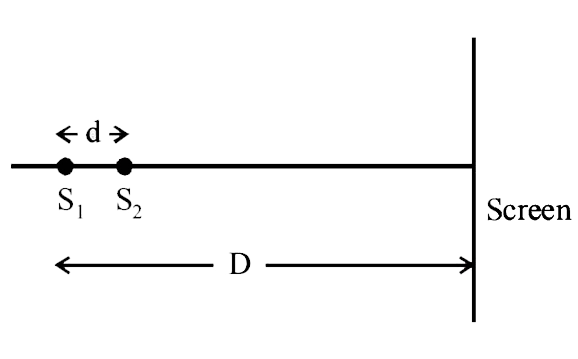
ellipse
straight lines
hyperbolas
concentric circles
The correct Answer is:D
Step by step video, text & image solution for Two coherent point sources S_1 and S_2 are separated by a small distance d as shown. The fringes obtained on the screen will be by Physics experts to help you in doubts & scoring excellent marks in Class 12 exams.
Topper's Solved these Questions
- BOOK - DC PANDEYCHAPTER - WAVE OPTICSEXERCISE - For JEE Advanced Only one option is correct23videos
WAVE OPTICS
- BOOK - DC PANDEYCHAPTER - WAVE OPTICSEXERCISE - For JEE Advanced B. More than one option is correct5videos
WAVE OPTICS
- BOOK - DC PANDEYCHAPTER - WAVE OPTICSEXERCISE - medical entrances42videos
WAVE OPTICS
- BOOK - DC PANDEYCHAPTER - SOLVED PAPERS 2018EXERCISE - JIPMER22videos
SOLVED PAPERS 2018
Similar Questions
Two coherent point sources S1 and S2 are located at a distance 4l from each other. Perpendicular to the straight line joining S1 and S2 there is a large screen at a distance of 1000 λ from S1 as shown in Figure. Find the radius of the third maxima starting from the point 0.
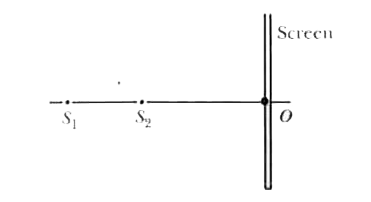 View Solution
View SolutionTwo coherent point sources S1andS2 vibrating in phase emit light of wavelength λ . The separation between them is 2λ . The light is collected on a screen placed at a distance D>>λ from the slit S1 as shown. The minimum distance, so that intensity at P is equal to the intensity at O
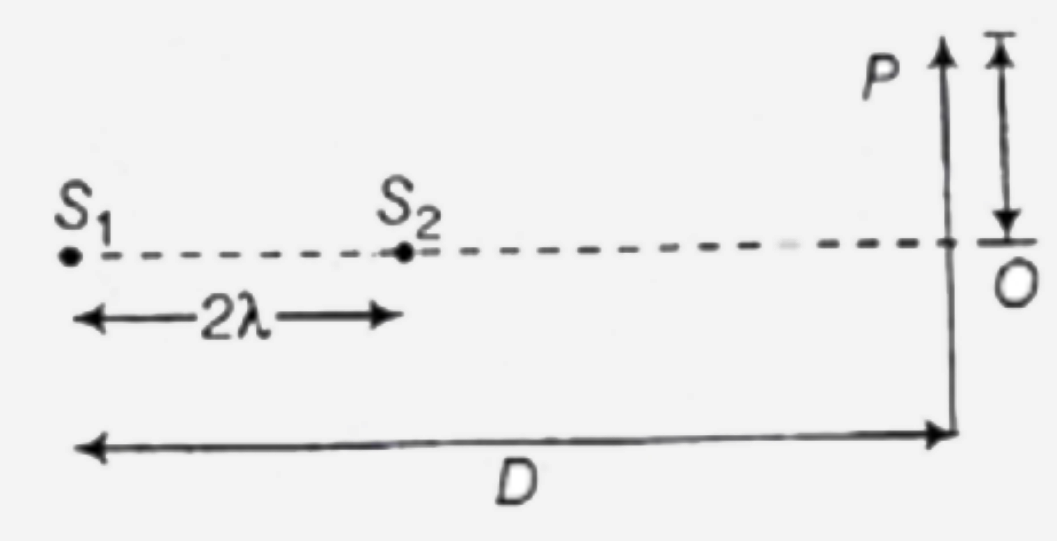 View Solution
View Solution
Knowledge Check
- Question 1 - Select One
Two monochromatic coherent point sources S1 and S2 are separated by a distance L. Each sources emits light of wavelength λ, where L>>λ. The line S1S2 when extended meets a screen perpendicular to it at point A. Then
Athe interference fringe on the screen are straight lines shapeBthe interference fringes on the screen are strainght lines perpendicular to the line S1S2ACpoint A is an intensity maxima if L=nλDpoint A is always an intensity maxima for any separation L - Question 2 - Select One
Two coherent sources S1 and S2 area separated by a distance four times the wavelength λ of the source. The sources lie along y axis whereas a detector moves along +x axis. Leaving the origin and far off points the number of points where maxima are observed is
A(a) 2B(b) 3C(c) 4D(d) 5 - Question 3 - Select One
Assertion: Two coherent sources S1andS2 are placed in front of a screen as shown in figure. At point P, 10th order maxima is obtained. Then , 11th order maxima will be obtained above P.

Reason: For 11th order maxima path difference should be more.A(a)If both Assertion and Reason are true and the Reason is correct explanation of the Assertion.B(b)If both Assertion and Reason are true and the Reason is not the correct explanation of the Assertion.C(c) If Assertion is true, but the Reason is false.D(d) If Assertion is false, but the Reason is true.
Two coherent monochromatic point sources S1 and S2 are placed in front of an infinite screen as shown in figure. Wavelength of the light emitted by both the sources is zero. Initial phase difference between the sources is zero.
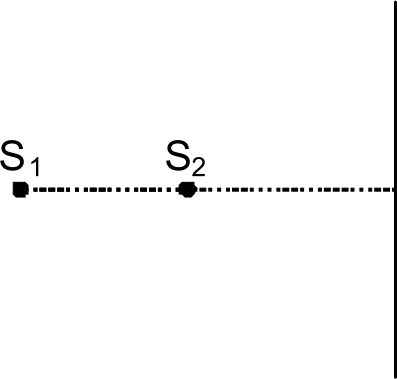
Initially S1S2=2.5λ and the number of bright circular rings on the screen in n1. if the distance S1S2 is increased and made 5.7λ, the number of bright circular rings becomes n2. the difference n2−n1 isView SolutionTwo coherent point sources S1 and S2 vibrating in phase emit light of wavelength λ. The separation between the sources is 2λ. Consider a line passing through S1 and perpendicular to line S1S2. Find the position of farthest and nearest minima.
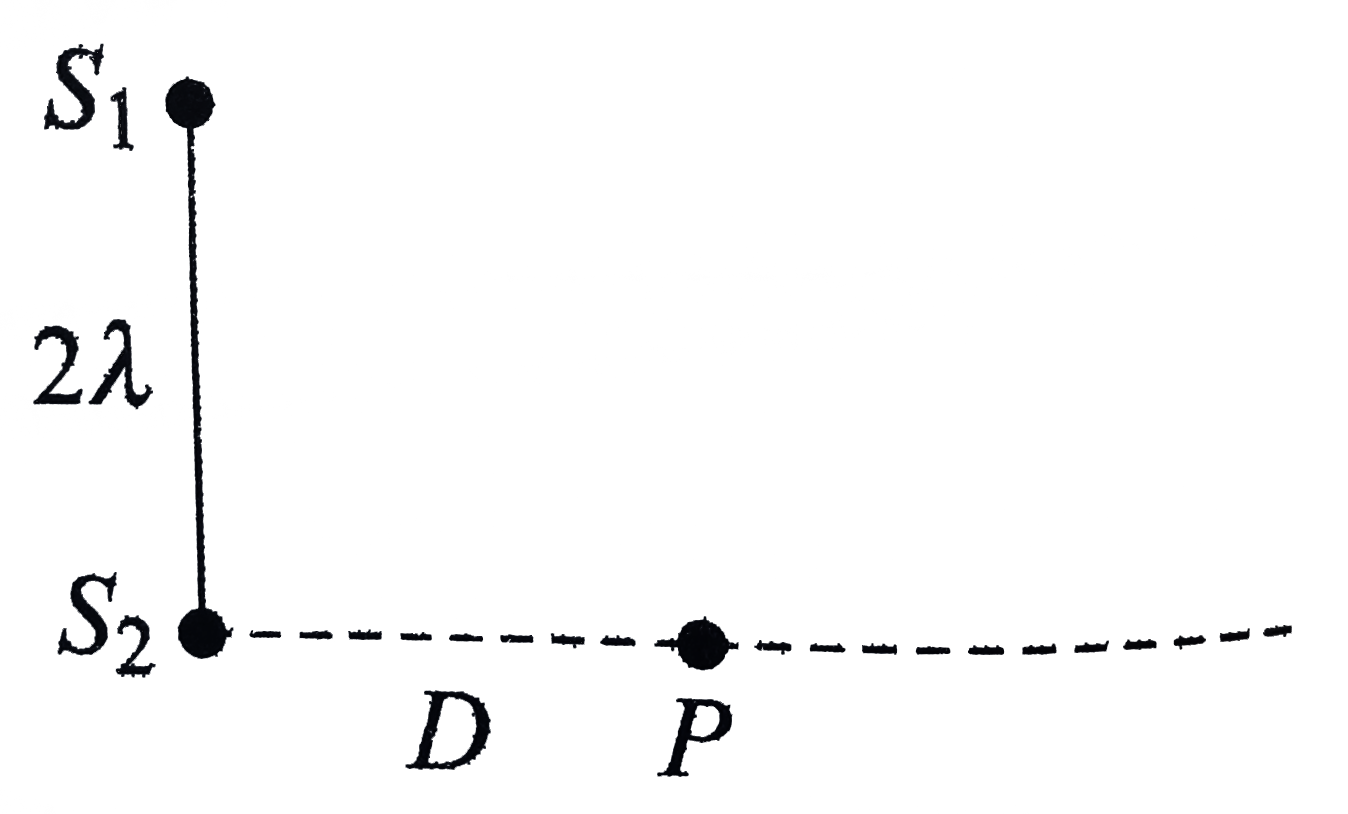 .View Solution
.View SolutionConsider two coherent, monochromatic (wavelength λ) sources S1andS2, separated by a distance d. The ratio of intensities of S1 and that of S2 (which is responsible for interference at point P, where detector is located) is 4. The distance of point P from S1 is (if the resultant intensity at point P is equal to 94 times of intensity of S1) (Given : ∠S2S1P=90∘,d>0andn is a positive integer)
View SolutionThree coherent point sources S1,S2andS3 are placed on a line perpendicular to the screen as shown in the figure. The wavelength of the light emitted by the sources is lambda. The distance between adjacent sources is d=3λ The distance of S2 from the screen is D(>>λ). Find the minimum (non zero) distance x of a point P on the screen at which complete darkness is obtained.
 View Solution
View SolutionTwo coherent point sources S1 and S2 vibrating in phase emit light of wavelength λ. The separation between the sources is 2λ. Consider a line passing through S2 and perpendicular to line S1S2. Find the position of farthest and nearest minima.
 .View Solution
.View Solution
